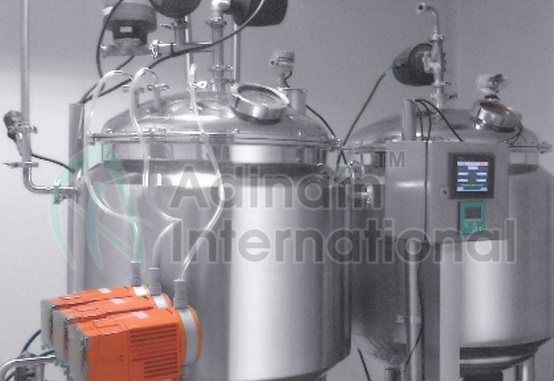Clean-in-Place (CIP) is a method used in process plants to clean big and medium-sized carriers, equipment, filters, and related components without removing them. It is a device used to prepare, deliver, issue, and afterwards remove cleaning solutions from contaminated equipment. The manual disassembly of closed systems for sanitization used to be a time-consuming, expensive, and labor-intensive process, which had an impact on productivity. The CIP ( Clean in Place System) system is a go-to option given that all facilities must maintain a certain level of cleanliness.
Industries that required frequent interior cleaning of their equipment and instruments benefited from the development of Mobile or Fixed CIP/SIP System Plant. A number of industries, such as those in the dairy, soft drink, processed food, cosmetics, pharmaceutical, and brewing sectors, rely on CIP to achieve high levels of sanitation and purity.
Modern CIP skids are sustainably constructed and intelligently built. The heart and soul of CIP is the skid. Through automated control, the skid provides all of the cleaning circuits with the necessary temperature, flow, and conductivity for the precise time. All leftover cleaning agents that were added during the process are likewise thrown away on this skid. The CIP/SIP systems are often mechanically regulated, and the best scheduling for the cleaning procedures is provided to ensure that all areas of the plants are cleaned thoroughly. CIP uses a combination of heat, water, and chemicals to clean the device without disassembling the plant. If everything is sent to recovery, which recycles the majority of the liquid, the task can be completed in one go.
Although CIPs come in a variety of styles and can also be custom tailored to meet the needs of the client, nearly all CIP skids share similar components that are crucial to their performance. The flow meter, pump, heat exchanger, temperature transmitter, and related valves and piping are included in this group of parts. For processing and cleaning, skid units can be manufactured in a modular, bespoke, automatic, or semi-automatic manner. These are intended to transport the cleaning solution to the contaminated system while also supplying water, introducing cleaning agents, and controlling temperature.
Factors affecting the potency of the cleaning agents:
- Contact Time of the Cleaning Agent: The more time a cleanser is in contact with a surface, the more efficiently it can clean.
- The cleaning detergent solution applies pressure that generates an abrasive force that disintegrates and removes the tenacious grime from inside the hardware.
- A concentrated product works far better than a dilute one at cleaning a dirty surface.
- The efficiency of the solution in removing pollutants rises as the solution’s temperature rises.
- Cleaning and draining capacity for process systems.
- Chemical characteristics like the pH and hardness of the solution or water.
- Biological characteristics such as end toxins, etc.
- Process-appliance type.
Features of CIP/SIP Skid: Benefits of using CIP /SIP Skid technique:
- Operation that requires little or no human interaction.
- Tracing batch and parameter recording capabilities.
- Controlled activity.
- Repeatable and reproducible process
- simple installation
- Minimal operation period (faster cleaning).
- No separating and reassembling of components.
- Improves the efficiency of production.
- Less time-consuming.
- A process that is repeatable and can be recorded for validation.
- A cleaning process that can be modified based on the equipment.
- Removes germs, yeast, and spores that are impossible to remove with any other method in addition to dirt.
- A satisfactory outcome.
- Workers are safer with less chemical exposure.
Applications of CIP/SIP skid:
A robust CIP system is a supposition when properly designed and assembled.
- Dairy Industry.
- Personal and home care.
- Food and beverage industry.
- Brewing industry.
- Bio-tech industry.
- Pharmaceutical industry.
The safety of your brand and the patrons that buy under it. A plant can achieve short cleaning durations, reduced downtime, more repeatability, less utility usage, and record cleaning parameters by automating the cleaning operation.

